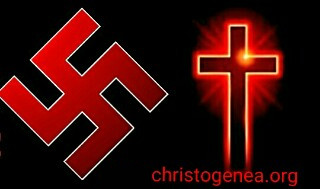Hitler’s War from a Christian Identity Perspective

Christogenea Saturdays, February 27th, 2016: Hitler’s War from a Christian Identity Perspective
Lately we have been discussing Christian Identity vision and objectives in presentations with Mark Downey and again in a recent article posted at Christogenea, which summarized some of the things we said in those presentations. Here we are going to offer what may at first seem to be a strange mix, especially to those who have not heard us speak about Adolf Hitler and National Socialism. This subject we have not touched on now for many months. What might seem to some to be a strange mix has a definite purpose. I would implore you not to accept the Anglo-American-Jewish propaganda concerning 20th century history. It absolutely amazes me that so many fools who claim to be Identity Christians, and especially pastors, still do accept all of those Jewish lies. Tonight I want to summarize, at least in part, what has happened in Europe and throughout the West in recent history, what is happening now as a result of that history, and also offer a summary of the proper perspective which the Identity Christians should have of both the events of recent history, and most importantly, of the place which we must assume for ourselves within the context of that history. All the Jews stand for lies, and we must stand for truth.
To help us accomplish this objective, we are going to present our recent article. But first, we we are going to present what is commonly known as Adolf Hitler’s last speech. It was a radio address to the German Volk made on January 30th, 1945. While it is short, we are going to read all of it, because it describes an earlier stage in the very same battle that our White race faces once again today. Except that comparatively, Whites as a collective people today are more like the Germans of 1922 than they are of 1933 or 1945. The speech is addressed to the German Volksgenossen, which are national comrades, and National Socialists, and ostensibly both labels were used to refer to the same people.

 The hour is late, and all of the formerly Christian nations are overcome with the enemies of Christ. The dusk is far too advanced for Christians to be wasting precious time arguing over the place of beasts in the kingdom of God, when it should be obvious to all that after 500 years of trying to civilize and make Christians of them, there has been little but misery and failure, and they are still nothing but beasts. The negro takes the image of Christ, remodels it in its own image, and destroys everything it touches in His Name. The Oriental takes up the image of Christ, and adds it to his collection of mystical talismans, imagining that it is just one more tool in the arsenal of idols that will help him to gratify his lusts, along with
The hour is late, and all of the formerly Christian nations are overcome with the enemies of Christ. The dusk is far too advanced for Christians to be wasting precious time arguing over the place of beasts in the kingdom of God, when it should be obvious to all that after 500 years of trying to civilize and make Christians of them, there has been little but misery and failure, and they are still nothing but beasts. The negro takes the image of Christ, remodels it in its own image, and destroys everything it touches in His Name. The Oriental takes up the image of Christ, and adds it to his collection of mystical talismans, imagining that it is just one more tool in the arsenal of idols that will help him to gratify his lusts, along with 



 Please click here for our mailing list sign-up page.
Please click here for our mailing list sign-up page.








Recent comments